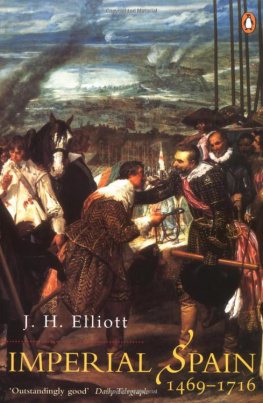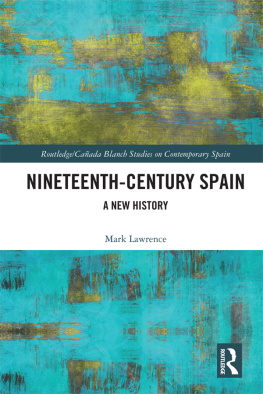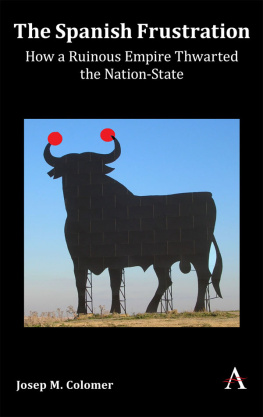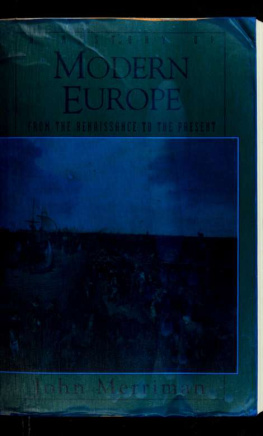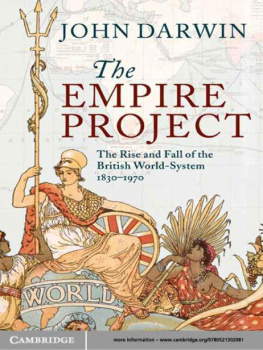PENGUIN BOOKS
IMPERIAL SPAIN
14691716
Sir John Elliott was born in 1930. He won a scholarship to Eton College, and then to Trinity College, Cambridge, where he was elected to a Fellowship in 1954 for a dissertation on the Catalan revolt of 1640, subsequently published as The Revolt of the Catalans (1963). He was an Assistant Lecturer and Lecturer in History at Cambridge University from 1957 to 1967, when he became Professor of History and head of the History Department at King's College in the University of London. He moved to the United States in 1973 to become a Professor in the School of Historical Studies at the Institute for Advanced Study, Princeton, where he remained until 1990 when he was appointed Regius Professor of Modern History in the University of Oxford, and a Fellow of Oriel College. He retired from the Regius Chair in 1997. He has published extensively on Spain, Europe and Spanish America in the Early Modern period, and his books include: Europe Divided, 15591598 (1968; 2nd edn, 2000); The Old World and the New, 14921650 (1970); A Palace for a King (in collaboration with Jonathan Brown, 1980); Richelieu and Olivares (1984); The Count-Duke of Olivares (1986); and a collection of essays, Spain and its World, 15001700 (1989). He was knighted for his services to history in 1984, and has received several honours and awards in Spain. In 1999 he won the Balzan Prize for History, 15001800, and he is currently working on a comparison of British and Spanish colonization in America.
J.H. ELLIOTT

IMPERIAL SPAIN
14691716

PENGUIN BOOKS
PENGUIN BOOKS
Published by the Penguin Group
Penguin Books Ltd, 80 Strand, London WC2R 0RL , England
Penguin Putnam Inc., 375 Hudson Street, New York, New York 10014, USA
Penguin Books Australia Ltd, 250 Camberwell Road, Camberwell, Victoria 3124, Australia
Penguin Books Canada Ltd, 10 Alcorn Avenue, Toronto, Ontario, Canada M4V 3B2
Penguin Books India (P) Ltd, 11 Community Centre, Panchsheel Park, New Delhi 110017, India
Penguin Books (NZ) Ltd, Cnr Rosedale and Airborne Roads, Albany, Auckland, New Zealand
Penguin Books (South Africa) (Pty) Ltd, 24 Sturdee Avenue, Rosebank 2196, South Africa
Penguin Books Ltd, Registered Offices: 80 Strand, London WC2R 0RL , England
www.penguin.com
First published by Edward Arnold 1963
Published in Pelican Books 1970
Reprinted in Penguin Books 1990
Reprinted with revised Foreword and Notes on Further Reading 2002
Copyright J. H. Elliott, 1963, 2002
All rights reserved
Except in the United States of America, this book is sold subject to the condition that it shall not, by way of trade or otherwise, be lent, re-sold, hired out, or otherwise circulated without the publisher's prior consent in any form of binding or cover other than that in which it is published and without a similar condition including this condition being imposed on the subsequent purchaser
ISBN:978-0-14-192557-8
Contents
Maps
Tables
Acknowledgements
T HIS book was read in typescript by Professor H. G. Koenigsberger of Nottingham University, and Professor A. A. Parker of the University of London. Their numerous comments were of the very greatest value in preparing the book for the press, and I have consistently taken their cogent criticisms into account when revising the text. While they bear no responsibility for the final product, it has gained immeasurably from their suggestions, and I am deeply grateful to them. In giving his comments from the standpoint of a specialist of literature, Professor Parker has rendered an additional service, at a time when contacts between historians and literary specialists are often distressingly rare. I am especially indebted to him for showing me how fruitful these contacts can be, and how historians neglect them at their peril. As a result of his labours, I hope that this book will be less misleading to those whose prime interest is in literature, than it would otherwise have been.
My wife has compiled the index, and has helped in the preparation both of the tables and of the maps, which were drawn by Miss Joan Emerson; and Dr R. Robson of Trinity College has again generously devoted his time to reading a colleague's proofs.
TRINITY COLLEGE, J.H.E.
CAMBRIDGE.
27 March 1963

Foreword
All historical works are the product of their time, and Imperial Spain is no exception to this rule. In the late 1950s, some time after I had completed my doctoral dissertation on the origins of the revolt of the Catalans in 1640 and had been lecturing at Cambridge University on the history of sixteenth- and seventeenth-century Spain, I was approached by the publishers Edward Arnold, who asked me if I would be interested in writing a textbook based on my Cambridge lectures. At that time the only available textbook in English on Spanish history of this period was R. Trevor Davies, The Golden Century of Spain, 15011621 , first published in 1937. The opportunity seemed to me an interesting one, and I decided to accept the challenge.
It proved more of a challenge than I had anticipated. Although the study of Spanish literature was flourishing in British and American universities, Spanish history was relatively neglected. Anglo-American historians with a specialist knowledge of the history of Habsburg Spain were almost non-existent, and in Spain itself, in the difficult post-Civil War years, few historians were in a position to engage in sustained archival research. Following the Second World War, the dominant force in European historical writing was the French school of the Annales . In 1949 Fernand Braudel published his monumental work La Mditerrane et le monde mditerranen l'poque de Philippe II , which revolutionized the traditional approach to Early Modern European history, and encouraged a new generation of historians, especially French historians, to embark on research into certain well-defined themes in the history of the Iberian peninsula. Traditionally, the writing of Spanish history had been slanted towards political narrative, but Braudel turned his back on political and diplomatic history, the history of mere events, in favour of the history of economic and social developments. By the end of the 1950s this Annales approach, although too marxisant to be acceptable in the repressive political climate of Franco Spain, was injecting new life into the writing of Spanish history.
While attracted by many aspects of the Braudelian revolution, I could not share all its assumptions and preconceptions, which seemed to me to imply a downgrading of the role of human agency, and, consequently, of the influence of power, politics and personality in the historical process. Although it was clear to me that the book I had been commissioned to write should give as much weight as possible to the findings of the new social and economic history, I was also anxious to provide the framework of political narrative that my publishers rightly regarded as indispensable for an Anglo-American readership likely to be largely unfamiliar with the history of sixteenth- and seventeenth-century Spain. The challenge that faced me was therefore to combine political narrative and social and economic analysis in a synthesis that would be both plausible and accessible.

